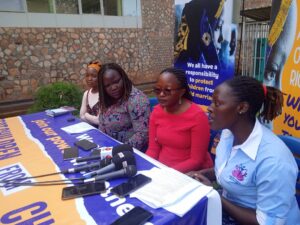
Child brides a deepening burden for Uganda as it is ranked 10th globally
19 December 2022, 3:59 pm

CEDOVIP and Girl Fund members addressing the media at Uganda museum in Kampala
Byamukama Alozious
byamukamaalozious1993@gmail.com
According to the World Bank report 2019, youth in Uganda are the youngest population in the world, with 77% of them being under 25 years of age. There are 7,310,386 youth from the ages of 15–24 years of age living in Uganda.
Child bride is still a burden and a challenge for Uganda as a country. Uganda is ranked the 10th globally with an estimation of about 4 million brides according to United Nations Children’s Fund report of 2021.
Child marriage refers to any formal marriage or informal union between a child under the age of 18 and an adult and another child. Child marriage is a violation of children’s rights with devastating effects like teenage pregnancies, school dropouts and medical health complications like fistula, shame and stigma.
Uganda has laws and policies in place that protect the rights of children for example on child marriage, defilement, child labour among others. Some of these laws include Article 34 of the Uganda Constitution of Uganda the Penal Code, Children’s Amendment Act 2019, the probation of Female Genital Mutilation Act 2010, Anti Trafficking in Persons Act 2009 and the National Child Policy 2020.
According to the Centre for Domestic Violence Prevention (CEDOVIP) report of 2021, 34 percent of married women were once married before the reaching the age of 18 years. The report also highlights that 7.3 percent were married before the age of 15. 8.9 million Girls aged 10-19 are at risk of harmful practices, including child marriage and female genital mutilation. The police crime report of 2021 indicates that 14,570 cases of defilement were registered and only 42 percent of those cases ended up in court with only 939 cases facing convictions.
To mark the end of 16 days of activism against gender-based violence and commemorate the International Human Rights Day, Centre for Domestic Violence Prevention (CEDOVIP) and Girl Child Fund highlight how the different stakeholders can contribute to the fight against child marriages in Uganda.
· There is need for Government to prioritize survivor-centered services for victims and survivors of child marriage and teenage pregnancies. In addition, government should consider age-appropriate sex education for school going children to enable students and pupils to have access to Sexual Reproductive Health and Rights information and services.
· Parliament of Uganda should prioritize passing of gender responsive laws like the Sexual Offences Bill since it provides for a separate offence on child marriage.
· Schools and higher institutions of learning should put in place laws and guidelines to enable girls who are victims of teenage pregnancy to attain education and should desist from shaming and stigmatizing them.
· Courts of Law should act fast on cases of sexual violence like defilement and rape, try and convict perpetrators for victims attain justice.
· Parents and guardians should desist from treating the girl child as sources of wealth but rather take back their children who have been victims of child marriage and teenage pregnancies to school and offer safe home environment.
· The police should strengthen its capacity in arresting and detaining perpetrators of child marriage and defilement and follow up such cases to the end.
· Community members should treat victims and survivors of child marriage with respect and dignity to enable them recover from the sexual violence. They should desist from using demeaning words to describe the victims but to understand that it is not their fault but rather the fault of the perpetrator. And in the same vein community members should hold men who defile girls accountable ,It is the responsibility of all adults regardless of whether they are care takers, uncles, aunts mothers, fathers, grandparents, neighbors, police, LCs or community members to protect children from defilement and child marriage.

